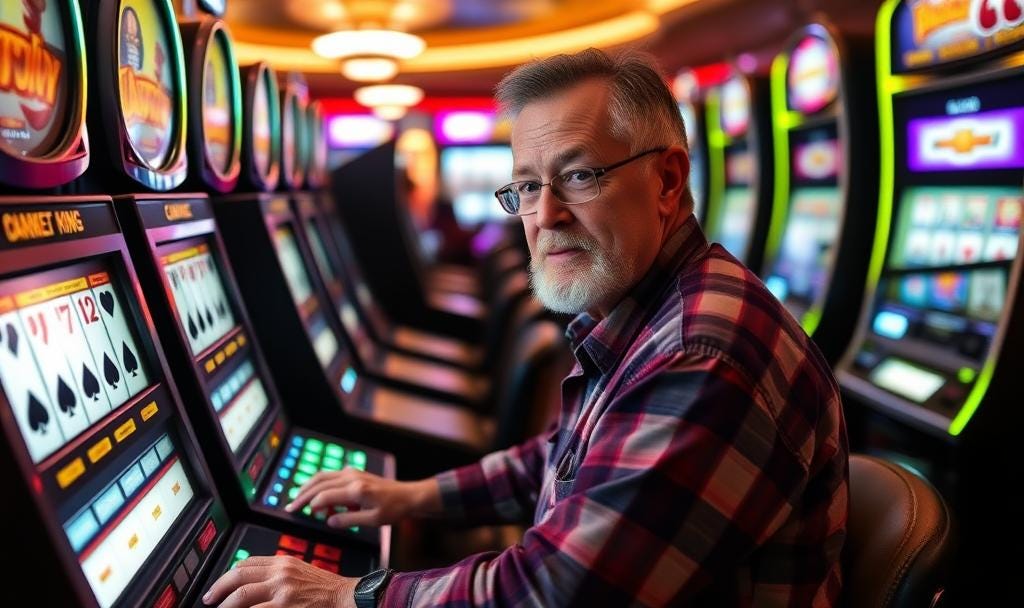John Cain led a life filled with rhythm and risk. He was a talented pianist who had spent forty years playing melodies, performing for crowds, and teaching music. By 2005, his consulting firm was doing well, working with thirty Fortune 100 companies. His big house in northeast Vegas was filled with three Steinway grand pianos and a detailed model train set, showing how careful and precise he was.
But behind the smooth music and tiny trains, John had a dangerous secret: gambling.
For a long time, John chased the rush of the casino. His quick fingers moved over video poker machines, especially a popular one called the Game King. He loved its different versions — Deuces Wild, Jacks or Better, Triple Play — that kept him hooked. By 2006, his gambling addiction had taken over. He lost about half a million dollars that year, mostly at Boulder Station Casino. The game promised that you could turn a penny into a big jackpot with a little luck, but it kept him stuck.
One evening in April 2009, at the Fremont Casino in downtown Vegas, John’s usual routine changed unexpectedly. While adjusting the bet on a Game King machine, he accidentally caused a glitch. The screen flashed and showed him winning $1,000—even though he hadn’t bet anything. Shocked, he called the casino worker, thinking the machine was broken. The worker, thinking John was joking, handed him the money.
Curious, John spent hours trying to recreate the glitch, using his skills as a musician to plan exactly how to do it. He reached out to an old friend, Andre Nester. They had met years earlier in an AOL chatroom for Vegas locals. Andre was thirteen years younger and worked answering phones at a bank. He also shared John’s love for gambling and had lost about $20,000 a year before he quit. He moved to a quiet town in Pennsylvania. When John told Andre about the glitch, Andre became interested. He booked a flight to Vegas so they could meet again at the Fremont Casino where they sat side by side at two Game King machines, eager to test their idea.
The glitch was real but tricky. Playing at the lowest bets — just pennies — could trigger a win and then change the machine’s settings to make it pay out as if they had bet the maximum of fifty cents. Small hands like four-of-a-kind, worth only a few cents, suddenly paid thousands of dollars.
After many hours of testing, they finally cracked the code. That night, they hit big jackpots and celebrated over dinner.
The Game King was everywhere—casinos, restaurants, even gas stations. To stay safe, they made a plan to visit different locations around Vegas. John was worried about Andre losing control and wasting their winnings on roulette or blackjack. Over dinner, he asked Andre to imagine what he would do with a million dollars, trying to get him to dream beyond gambling. Their scheme worked well at Fremont. But when they tried other casinos like the Hilton, Hard Rock, and Luxor, the glitch stopped working. Confused, they returned to Fremont, and it worked again. Andre flew back to Pennsylvania with $8,000, even though he lost $700 at the airport’s slot machines. John kept playing and winning until a slot manager caught on. The “double up” feature on the machines was risky to use. Without it, the glitch disappeared.
John called Andre, who realized that the double up feature was the key. Andre flew back to Vegas, and they made a new plan. They asked casino staff to turn the feature back on. At a new casino, Andre hit four of a kind for $500 and used the special sequence to turn it into $10,000. They kept improving their method, moving from one casino to another and making tens of thousands of dollars.
They also found an even bolder trick and could trigger the same payout multiple times without drawing new cards each time. It made their winnings grow even faster and more often.
To stay undetected, they would switch seats after a big win and then leave quickly.
Andre, a man struggling on welfare, saw the money as a way to start fresh—buy a home, buy nice clothes, buy gifts for friends. John, who always thought like a businessman, wanted the share. That caused tension between them. Eventually, Andre went back to Pennsylvania with the $152,000 he won at casinos like Wynn and Rio. John kept going alone, hitting eight casinos and winning more than $500,000. At the Silverton Casino, in a fancy high-limit room filled with aquariums and mermaids, he hit jackpot after jackpot, winning amounts like $4,300, $2,800, and $4,100. But after winning $8,200, a casino worker didn’t come to pay him. Instead, security arrived.
They handcuffed John and took him into a back room. His machine was shut down, and he spent a night in Clark County Detention Center, facing theft charges. After being released, he warned Andre. Andre brushed it off, calling it jealousy. He kept playing at a casino in Pennsylvania and won $480,000 more. But on August 6, 2009, police burst into Andre’s condo with a battering ram to break down the door, cuffed him and searched his home, taking all his money. His team, including a retired cop bodyguard and a Red Lobster server who was collecting winnings, was arrested too. Andre faced nearly 700 felony charges, such as theft and conspiracy. He was sent to Las Vegas to stand trial with John on federal charges.
The FBI accused them of hacking into the machines under the Computer Fraud and Abuse Act. As claimed, the pair had exploited a bug that let them get extra money. The defense said they only used the machine’s normal features. The case lasted for over a year and a half. During that time, similar cases showed the law wasn’t always clear. Neither Andre nor John wanted to testify against each other, hoping for lighter sentences. Without strong evidence, prosecutors dropped the case.
Andre’s winnings were taken, and the IRS wanted him to pay $239,000 in taxes. He was banned from casinos.
He and John drifted apart. The friendship was broken by greed.
John returned to playing his pianos, unsure what had happened to his share of the money. The Nevada Gaming Control Board found the bug and warned IGT, the machine’s maker. They discovered the flaw had gone unnoticed for seven years in thousands of machines around the world. A quick fix was rolled out to patch the problem. They disabled the feature that allowed double-ups to stop the cheat. Some patched machines remained in hidden corners where no one saw them.
The secret about what they did kept the story from reaching many people. Casinos avoided a major problem worldwide. In Las Vegas, the horse always wins. But for a short time, two men changed the game. The story was a quiet tune drowned out by busy city noise.





